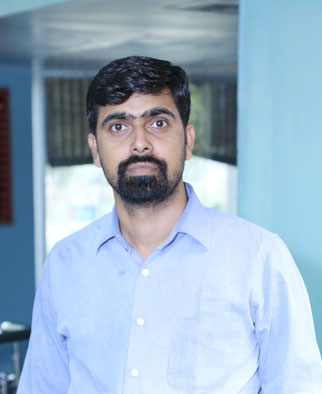
Dr. Anand Kamal Sachdeva
Senior- Associate Scientist | Preclinical Research
Postdoc
“Research is to see what everybody else has seen, and to think what nobody else has thought.”
Years at VMRC
Publications
Awards & Honors
Presently our team is working on Stealth Targeted Nanoparticles (STN) design of nanocarriers for oral delivery of poorly bioavailable drugs especially antibiotics. Patients preferred oral route over intravenous route.
The route of administration and the duration of treatment are variables that influence the study outcome. Route of administration of any compound is an important part in a pre-clinical study which includes bioavailability, bioequivalence as well as biocompatibility. In preclinical studies, pharmacokinetic and pharmacodynamic factors play a vital role in the evaluation of any agents. Only when the metabolic profile and pharmacodynamic characteristics of a drug are understood can the most efficient testing protocol be designed for a particular agent. Due to metabolic differences and pharmacodynamic factors, different results may be obtained depending on whether drugs are administered orally or intravenously.
Preclinical research offers the evaluation of potential therapeutic interventions in an animal model of the disease. Candidates for entry into clinical trials can then be selected based on their effectiveness and safety in disease models. All drugs require data from various toxicological preclinical studies to support their potential safety in humans before clinical trials can begin.
Medicines can be of amazing benefit to human health, they can also be extremely dangerous if not researched and/or administered correctly. The thalidomide disaster is one of the darkest episodes in pharmaceutical research history. It caused thousands of babies worldwide to be born with malformed limbs due to lack of animal testing. The thalidomide tragedy gives us lessons for Drug Safety and Regulation requirements and inspired us to work in this area.
- Development of a various animal model for infectious disease (Thigh infection, lung infection and urinary tract infection, gonorrhoea and septicemia) and validation these models.
- Evaluate the efficacy study of antibiotic formulations in validated models.
- In-vivo preclinical Pharmacokinetics and pharmacodynamics studies.
- Toxicity study in a novel formulation as per GLP requirements.
Time-response studies on the development of cognitive deficits in an experimental model of insulin resistance.
Clinical Nutrition, 38(3):1447-1456. doi: 10.1016/j.clnu.2018.06.966. (Impact Factor- 4.487).
Sachdeva AK, Dharavath RN, Chopra K. (2019)
Lycopene abrogates Aβ(1–42)-mediated neuro-inflammatory cascade in an experimental model of Alzheimer’s disease.
Journal of Nutritional Biochemistry. 26(7):736-44. doi: 10.1016/j.jnutbio.2015.01.012. (Impact Factor- 4.668).
Sachdeva AK and Chopra K. (2015)
Naringin mitigates okadaic acid-induced cognitive impairment in an experimental paradigm of Alzheimer's disease.
Journal of Functional food, 19, 110-25. doi.org/10.1016/j.jff.2015.08.024 (Impact Factor- 4.480).
Sachdeva AK and Chopra K. (2015)
Phytochemicals: Potential in Management of Climacteric Neurobiology.
Current Pharmaceutical Design, 22(27):4098- 110.doi:10.2174/1381612822666160607071839 (Impact Factor 3.452)
Chopra K, Bansal S, Sachdeva AK. (2016)
Neuroprotective potential of sesamol and its loaded solid lipid nanoparticles in ICV-STZ-induced cognitive deficits: Behavioral and biochemical evidence.
European journal of pharmacology. 747C:132-40. doi: 10.1016/j.ejphar.2014.11.014. (Impact Factor- 2.730)
Sachdeva AK, Misra S, Pal Kaur I, Chopra K. (2014)
Naringin ameliorates memory deficits in an experimental paradigm of Alzheimer's disease by attenuating mitochondrial dysfunction.
Pharmacology, biochemistry, and behavior;127C:101-10. doi: 10.1016/j.pbb.2014.11.002 (Impact Factor- 2.820)
Sachdeva AK, Kuhad A, Chopra K. (2014)
Epigallocatechin gallate ameliorates behavioral and biochemical deficits in a rat model of load-induced chronic fatigue syndrome.
Brain research bulletin, 86:165-72, doi: 10.1016/j.brainresbull.2011.06.007. (Impact Factor- 2.974)
Sachdeva AK, Kuhad A, Chopra K.(2011)
Protective effect of epigallocatechin gallate in murine water-immersion stress model of chronic fatigue syndrome.
Basic & clinical pharmacology & toxicology, 106:490-6. doi: 10.1111/j.1742- 7843.2009.00525.x. (Impact Factor- 3.097)
Sachdeva AK, Kuhad A, Tiwari V, Arora V, Chopra K.(2010)
Epigallocatechin gallate ameliorates chronic fatigue syndrome in mice: behavioral and biochemical evidence
Behavioural brain research, 205:414-20. doi: 10.1016/j.bbr.2009.07.020. (Impact Factor- 3.391)
Sachdeva AK, Kuhad A, Tiwari V, Chopra K.(2009)
Attenuation of the reno-inflammatory cascade in an experimental model of diabetic nephropathy by sesamol.
Journal of agricultural and food chemistry, 57:6123-8. DOI: 10.1021/jf901388g. (Impact Factor- 3.107)
Kuhad A, Sachdeva AK, Chopra K. (2009)
Subacute intravenous toxicity study of disodium EDTA in Swiss albino mice
World JPharm Pharm Sci. 2016, 5 (10):1100-15 doi: 10.20959/wjpps201610-7861.
Chaudhary M , Kumar P, Kumar S, Sachdeva AK, M Vinoth Kumar. (2016)
Resveratrol and Lycopene in the Diet and Cancer Prevention.
Cancer. San Diego: Academic Press; Preedy V, editor. . p. 127-38. doi: 10.1016/B978-0-12-405205-5.00012-X
Arora V, Sachdeva AK, Singh P, Baveja A, Chopra K, Kuhad A.
Neuroprotective effect of sesamol and its loaded solid lipid nanoparticles in intracerebroventricular streptozotocin-induced cognitive impairment and oxidative-nitrosative stress in rats
McGraw-Hill, International publishers the USA. 6-13; 887-95.
Sachdeva AK, Mishra S, Kaur IP, Chopra K.
Direct-to-consumer advertising: Benefaction or affliction Advance Pharmacology.
BSP books Pvt. Ltd. P. 101-109.
Arora V, Kuhad A, Sachdeva AK and Kanwaljit Chopra
Resveratrol abrogates insulin resistance-induced pain-depression dyad in rats.
Journal of Neuro chemistry, 134, 190-91, doi: https://doi.org/10.1016/j.jalz.2016.06.2136 (Impact Factor 4.281)
Sachdeva AK, Chopra K. (2015)
Development of an experimental model of insulin resistance–induced Alzheimer's disease.
Alzheimer's & Dementia, 9(4), Supplement, 156-P157, https://doi.org/10.1016/j.jalz.2013.05.229, (Impact Factor- 17.47)
Sachdeva AK, Kuhad A, Chopra K. (2013)
Suppression of NF- κB signaling pathway by lycopene can prevent insulin resistance-associated cognitive deficits.
Alzheimer's & Dementia, 11(1), Supplement, P531 doi: https://doi.org/10.1016/j.jalz.2014.05.84. (Impact Factor- 17.47)
Sachdeva AK, Kuhad A, Chopra K. (2014)
Resveratrol attenuates insulin resistance-induced cognitive deficits in rats.
Alzheimer's & Dementia, 11(7), Supplement, P 839. https://doi.org/10.1016/j.jalz.2015.06.1865. (Impact Factor- 17.47)
Sachdeva AK, Chopra K. (2015)
Sesamol, a phenolic antioxidant, attenuates chronic fatigue syndrome in murine water immersion stress model.
Indian Journal of Pharmacology 40, 76-76
Sachdeva AK, Sethi R, Kuhad A, Chopra K. (2009)
- Post-doctoral research at Panjab University, Chandigarh
- Doctorate at Panjab University, Chandigarh in Faculty of Pharmaceutical Sciences
- Post-Graduate Studies at Panjab University, Chandigarh in Pharmacology
- Graduate Studies at University of Rajasthan, Jaipur (Raj.) in Pharmacy
- Got Consistence employee award for the year 2016-17 from VMRC management
- Received CSIR- Senior research fellowship (2012-2016)
- Received travel fellowship to attend the “Alzheimer’s Association International Conference® 2016” (AAIC®) in Toronto, Canada
- Received “Best poster prize” in 1st IBRO/APRC Chandigarh Neuroscience Symposium, Chandigarh (Feb 5, 2016).
- Received ANS-ISN-IBRO travel award for attending “Australasian Neuroscience Society” (ANS) held at Cairns, Australia( August 23-27, 2015)
- IBRO-APRC Travel grants for attending the 37th Annual Meeting of the Japan Neuroscience Society (JNS) held in Yokohama, Japan (September 11-13, 2014)
- Received IASP travel grant for attending 15th World Congress on Pain held in Buenos Aires, Argentina (October 6-11, 2014).
- Alzheimer’s Association International Conference (AAIC) Travel Fellowship for attending AAIC-2013 held in Boston, Massachusetts, The United States (July 13-18, 2013).
- Received “Young Scientist Travel Award” for attending 8th IBRO world congress, Florence Italy (July 12-19, 2011).
- Received “Best poster prize” in 8th IBRO world congress of Neuroscience, Florence, Italy by Italian Society of Neuroscience (July 12-19, 2011).
- Received fellowship for attending APRC associated school of Neuroscience, Taiyuan, Shanxi PR China ( Nov 2011)
- Received UGC- Major Research fellowship (2011)
- Received UGC-JRF fellowship during Post Graduation (2007-2009)
- Secure AIR 20 & 99.89 percentile in GATE 2007
